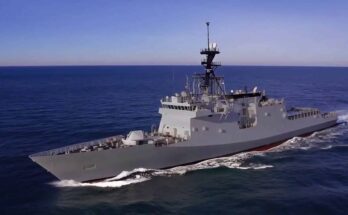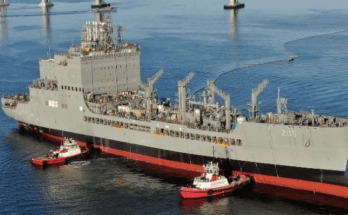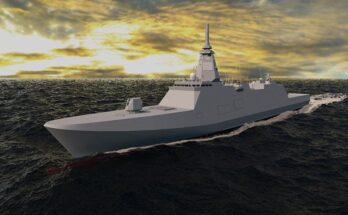Pakistan and Turkey have agreed to a memorandum of understanding on each acquiring military systems.
The Turkish defense industry undersecretariat stated on May 10, 2017 that Turkey and Pakistan had signed a memorandum of understanding on the sale of weapons, according to Reuters.
Reuters reported,
“Turkey and Pakistan have signed a memorandum of understanding for the sale of four Turkish made corvette warships and 52 Pakistan-made training planes for Ankara’s armed forces, Turkey’s defense industry undersecretariat said on Wednesday.
Karachi Shipyard (KS&EW) will buy four corvettes made under Turkey’s MILGEM warship program, aimed at designing and building locally a fleet of multipurpose corvettes and frigates that will replace older ships.”
The two sides will ink the final agreement by the end of June 2017.
The Super Mushshaks, produced by Pakistan Aeronautical Complex – Kamra, will replace T-41s and SF-260s currently in Turkish service.
Last June, analyst Bilal Khan noted in a report for Quwa that Turkish and Pakistani officials were negotiating over the sale of the trainer aircraft and MILGEM corvettes (Ada class). Islamabad has had a desire for new modern corvettes for over a decade, according to Khan.
He cited Turkish media as indicating that Ankara may offer Islamabad a loan of $400 million in order to help close the corvette sale. It is unclear if Pakistan opted to take that offer; official financial details on the proposed deal have not been released. Defense News reported, citing a Turkish official, on May 10, 2017 that the total cost of the four corvettes would be around $1 billion.
Turkey also is in negotiations with Pakistan over a sale of T-129 attack helicopters.
UPDATE: This post has been updated to include reports by Defense News.
Military markets analyst, covering Eurasia, Middle East, and Africa.
- Derek Bisaccio
- Derek Bisaccio
- Derek Bisaccio
- Derek Bisaccio
- Derek Bisaccio
- Derek Bisaccio
- Derek Bisaccio
- Derek Bisaccio
- Derek Bisaccio
- Derek Bisaccio
- Derek Bisaccio
- Derek Bisaccio
- Derek Bisaccio
- Derek Bisaccio
- Derek Bisaccio
- Derek Bisaccio
- Derek Bisaccio
- Derek Bisaccio
- Derek Bisaccio
- Derek Bisaccio
- Derek Bisaccio
- Derek Bisaccio
- Derek Bisaccio
- Derek Bisaccio
- Derek Bisaccio
- Derek Bisaccio
- Derek Bisaccio
- Derek Bisaccio
- Derek Bisaccio
- Derek Bisaccio
- Derek Bisaccio
- Derek Bisaccio
- Derek Bisaccio
- Derek Bisaccio
- Derek Bisaccio
- Derek Bisaccio
- Derek Bisaccio
- Derek Bisaccio
- Derek Bisaccio
- Derek Bisaccio
- Derek Bisaccio
- Derek Bisaccio
- Derek Bisaccio
- Derek Bisaccio
- Derek Bisaccio
- Derek Bisaccio
- Derek Bisaccio
- Derek Bisaccio
- Derek Bisaccio
- Derek Bisaccio
- Derek Bisaccio
- Derek Bisaccio
- Derek Bisaccio
- Derek Bisaccio
- Derek Bisaccio
- Derek Bisaccio
- Derek Bisaccio
- Derek Bisaccio
- Derek Bisaccio
- Derek Bisaccio
- Derek Bisaccio
- Derek Bisaccio
- Derek Bisaccio
- Derek Bisaccio
- Derek Bisaccio
- Derek Bisaccio
- Derek Bisaccio
- Derek Bisaccio
- Derek Bisaccio
- Derek Bisaccio
- Derek Bisaccio
- Derek Bisaccio
- Derek Bisaccio
- Derek Bisaccio
- Derek Bisaccio
- Derek Bisaccio
- Derek Bisaccio
- Derek Bisaccio
- Derek Bisaccio
- Derek Bisaccio
- Derek Bisaccio
- Derek Bisaccio
- Derek Bisaccio
- Derek Bisaccio
- Derek Bisaccio
- Derek Bisaccio
- Derek Bisaccio
- Derek Bisaccio
- Derek Bisaccio
- Derek Bisaccio
- Derek Bisaccio
- Derek Bisaccio
- Derek Bisaccio
- Derek Bisaccio
- Derek Bisaccio
- Derek Bisaccio
- Derek Bisaccio
- Derek Bisaccio
- Derek Bisaccio
- Derek Bisaccio
- Derek Bisaccio
- Derek Bisaccio
- Derek Bisaccio
- Derek Bisaccio
- Derek Bisaccio
- Derek Bisaccio
- Derek Bisaccio
- Derek Bisaccio
- Derek Bisaccio
- Derek Bisaccio
- Derek Bisaccio
- Derek Bisaccio
- Derek Bisaccio
- Derek Bisaccio
- Derek Bisaccio
- Derek Bisaccio
- Derek Bisaccio
- Derek Bisaccio
- Derek Bisaccio
- Derek Bisaccio
- Derek Bisaccio
- Derek Bisaccio
- Derek Bisaccio
- Derek Bisaccio
- Derek Bisaccio
- Derek Bisaccio
- Derek Bisaccio
- Derek Bisaccio
- Derek Bisaccio
- Derek Bisaccio
- Derek Bisaccio
- Derek Bisaccio
- Derek Bisaccio
- Derek Bisaccio
- Derek Bisaccio
- Derek Bisaccio
- Derek Bisaccio
- Derek Bisaccio
- Derek Bisaccio
- Derek Bisaccio
- Derek Bisaccio
- Derek Bisaccio
- Derek Bisaccio
- Derek Bisaccio
- Derek Bisaccio
- Derek Bisaccio
- Derek Bisaccio
- Derek Bisaccio
- Derek Bisaccio
- Derek Bisaccio
- Derek Bisaccio
- Derek Bisaccio
- Derek Bisaccio
- Derek Bisaccio
- Derek Bisaccio
- Derek Bisaccio
- Derek Bisaccio
- Derek Bisaccio
- Derek Bisaccio
- Derek Bisaccio
- Derek Bisaccio
- Derek Bisaccio
- Derek Bisaccio
- Derek Bisaccio
- Derek Bisaccio
- Derek Bisaccio
- Derek Bisaccio
- Derek Bisaccio
- Derek Bisaccio
- Derek Bisaccio
- Derek Bisaccio
- Derek Bisaccio
- Derek Bisaccio
- Derek Bisaccio
- Derek Bisaccio
- Derek Bisaccio
- Derek Bisaccio
- Derek Bisaccio
- Derek Bisaccio
- Derek Bisaccio
- Derek Bisaccio
- Derek Bisaccio
- Derek Bisaccio
- Derek Bisaccio
- Derek Bisaccio
- Derek Bisaccio
- Derek Bisaccio
- Derek Bisaccio
- Derek Bisaccio
- Derek Bisaccio
- Derek Bisaccio
- Derek Bisaccio
- Derek Bisaccio
- Derek Bisaccio
- Derek Bisaccio
- Derek Bisaccio
- Derek Bisaccio
- Derek Bisaccio
- Derek Bisaccio
- Derek Bisaccio
- Derek Bisaccio
- Derek Bisaccio
- Derek Bisaccio
- Derek Bisaccio
- Derek Bisaccio
- Derek Bisaccio
- Derek Bisaccio
- Derek Bisaccio
- Derek Bisaccio
- Derek Bisaccio
- Derek Bisaccio
- Derek Bisaccio
- Derek Bisaccio
- Derek Bisaccio
- Derek Bisaccio
- Derek Bisaccio
- Derek Bisaccio
- Derek Bisaccio
- Derek Bisaccio
- Derek Bisaccio
- Derek Bisaccio
- Derek Bisaccio
- Derek Bisaccio
- Derek Bisaccio
- Derek Bisaccio
- Derek Bisaccio
- Derek Bisaccio
- Derek Bisaccio
- Derek Bisaccio
- Derek Bisaccio
- Derek Bisaccio
- Derek Bisaccio
- Derek Bisaccio
- Derek Bisaccio
- Derek Bisaccio
- Derek Bisaccio
- Derek Bisaccio
- Derek Bisaccio
- Derek Bisaccio
- Derek Bisaccio
- Derek Bisaccio
- Derek Bisaccio
- Derek Bisaccio
- Derek Bisaccio
- Derek Bisaccio
- Derek Bisaccio
- Derek Bisaccio
- Derek Bisaccio
- Derek Bisaccio
- Derek Bisaccio
- Derek Bisaccio
- Derek Bisaccio
- Derek Bisaccio
- Derek Bisaccio
- Derek Bisaccio
- Derek Bisaccio
- Derek Bisaccio
- Derek Bisaccio
- Derek Bisaccio
- Derek Bisaccio
- Derek Bisaccio
- Derek Bisaccio
- Derek Bisaccio
- Derek Bisaccio
- Derek Bisaccio
- Derek Bisaccio
- Derek Bisaccio
- Derek Bisaccio
- Derek Bisaccio
- Derek Bisaccio
- Derek Bisaccio
- Derek Bisaccio
- Derek Bisaccio
- Derek Bisaccio
- Derek Bisaccio
- Derek Bisaccio
- Derek Bisaccio
- Derek Bisaccio
- Derek Bisaccio
- Derek Bisaccio
- Derek Bisaccio
- Derek Bisaccio
- Derek Bisaccio
- Derek Bisaccio
- Derek Bisaccio
- Derek Bisaccio
- Derek Bisaccio
- Derek Bisaccio
- Derek Bisaccio
- Derek Bisaccio
- Derek Bisaccio
- Derek Bisaccio
- Derek Bisaccio
- Derek Bisaccio
- Derek Bisaccio
- Derek Bisaccio
- Derek Bisaccio
- Derek Bisaccio
- Derek Bisaccio
- Derek Bisaccio
- Derek Bisaccio
- Derek Bisaccio
- Derek Bisaccio
- Derek Bisaccio
- Derek Bisaccio
- Derek Bisaccio
- Derek Bisaccio
- Derek Bisaccio
- Derek Bisaccio
- Derek Bisaccio
- Derek Bisaccio
- Derek Bisaccio
- Derek Bisaccio
- Derek Bisaccio
- Derek Bisaccio
- Derek Bisaccio
- Derek Bisaccio
- Derek Bisaccio
- Derek Bisaccio
- Derek Bisaccio
- Derek Bisaccio
- Derek Bisaccio
- Derek Bisaccio
- Derek Bisaccio
- Derek Bisaccio
- Derek Bisaccio
- Derek Bisaccio
- Derek Bisaccio
- Derek Bisaccio
- Derek Bisaccio
- Derek Bisaccio
- Derek Bisaccio
- Derek Bisaccio
- Derek Bisaccio
- Derek Bisaccio
- Derek Bisaccio
- Derek Bisaccio
- Derek Bisaccio
- Derek Bisaccio
- Derek Bisaccio
- Derek Bisaccio
- Derek Bisaccio
- Derek Bisaccio
- Derek Bisaccio
- Derek Bisaccio
- Derek Bisaccio
- Derek Bisaccio
- Derek Bisaccio
- Derek Bisaccio
- Derek Bisaccio
- Derek Bisaccio
- Derek Bisaccio
- Derek Bisaccio
- Derek Bisaccio
- Derek Bisaccio
- Derek Bisaccio
- Derek Bisaccio
- Derek Bisaccio
- Derek Bisaccio
- Derek Bisaccio
- Derek Bisaccio
- Derek Bisaccio
- Derek Bisaccio
- Derek Bisaccio
- Derek Bisaccio
- Derek Bisaccio
- Derek Bisaccio
- Derek Bisaccio
- Derek Bisaccio
- Derek Bisaccio
- Derek Bisaccio
- Derek Bisaccio
- Derek Bisaccio
- Derek Bisaccio
- Derek Bisaccio
- Derek Bisaccio
- Derek Bisaccio
- Derek Bisaccio
- Derek Bisaccio
- Derek Bisaccio
- Derek Bisaccio
- Derek Bisaccio
- Derek Bisaccio
- Derek Bisaccio
- Derek Bisaccio
- Derek Bisaccio
- Derek Bisaccio
- Derek Bisaccio
- Derek Bisaccio
- Derek Bisaccio
- Derek Bisaccio
- Derek Bisaccio
- Derek Bisaccio
- Derek Bisaccio
- Derek Bisaccio
- Derek Bisaccio
- Derek Bisaccio
- Derek Bisaccio
- Derek Bisaccio
- Derek Bisaccio
- Derek Bisaccio
- Derek Bisaccio
- Derek Bisaccio
- Derek Bisaccio
- Derek Bisaccio
- Derek Bisaccio
- Derek Bisaccio
- Derek Bisaccio
- Derek Bisaccio
- Derek Bisaccio
- Derek Bisaccio
- Derek Bisaccio
- Derek Bisaccio
- Derek Bisaccio
- Derek Bisaccio
- Derek Bisaccio
- Derek Bisaccio
- Derek Bisaccio
- Derek Bisaccio
- Derek Bisaccio
- Derek Bisaccio
- Derek Bisaccio
- Derek Bisaccio
- Derek Bisaccio
- Derek Bisaccio
- Derek Bisaccio
- Derek Bisaccio
- Derek Bisaccio
- Derek Bisaccio
- Derek Bisaccio
- Derek Bisaccio
- Derek Bisaccio
- Derek Bisaccio
- Derek Bisaccio
- Derek Bisaccio
- Derek Bisaccio
- Derek Bisaccio
- Derek Bisaccio
- Derek Bisaccio
- Derek Bisaccio




